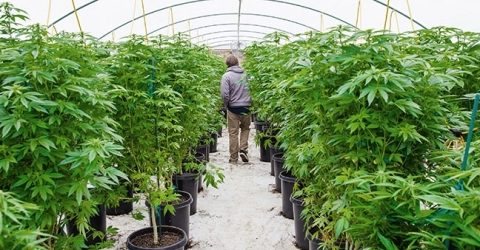The following articles were printed from Santa Maria Sun [santamariasun.com] – Volume 21, Issue 19
Grand jury criticizes county’s cannabis regulations in recent report
By Zac Ezzone
Echoing many of the talking points of the local anti-cannabis crowd, the Santa Barbara County grand jury recently released a scathing report in which it criticized county officials for allowing the creation of a cannabis industry to the detriment of county residents.
“The action taken by the Santa Barbara County Board of Supervisors to certify the development of a robust cannabis industry as the primary objective of the cannabis ordinances has altered the quality of life in Santa Barbara County, perhaps forever,” the June 30 report states.
In the report, the grand jury listed numerous concerns with the county’s drafting of its ordinances, including the formation of an ad hoc committee in early 2017 that 1st District Supervisor Das Williams and 5th District Supervisor Steve Lavagnino served on. This committee was tasked with coming up with ideas for the county to implement that would allow a legal cannabis industry to operate within the county.
This committee wasn’t subject to the state’s Brown Act and therefore didn’t hold public meetings, which the jury said created a lack of transparency. The jury states that this process was “not good government” and led to a “seriously flawed law.”
Additionally, the jury states that during the drafting of the county’s cannabis ordinances—which were approved in early 2018—cannabis lobbyists had an inappropriate level of access to county supervisors. This led to regulations that were in favor of the industry, the jury claims.
“While the jury understands that sending emails to advocate positions favorable to the interests of their client is part of the job of a lobbyist, it was unnerving to the jury to see both the tone and timing of these emails,” the report states.
The jury also criticized the Board of Supervisors for not taking more seriously concerns regarding odor and potential ways the cannabis industry could affect other forms of agriculture. The jury repeatedly states that the county ignored many other issues in its pursuit of regulations that would create a robust cannabis industry.
Although the jury doesn’t name the people in its reports, its critique of the ad hoc committee falls on Williams and Lavagnino, the supervisors involved. The latter said the report ignores a lot of the context around the decisions that were made and essentially rewrites history.
For example, while the ad hoc committee didn’t hold public meetings, the ideas the committee developed went before the full Board of Supervisors and were discussed at numerous public hearings. The ordinance eventually passed on a 4-1 vote.
When it comes to his conversations with lobbyists and acceptance of campaign donations, Lavagnino said he didn’t show any preferential treatment. He abided by county campaign rules and met with whoever reached out to him, both pro-cannabis people and those who were against the industry. The fact that on policy issues he happened to agree more often with the industry doesn’t mean it had unequal access, he said.
While in its report the jury is critical of the tax system the county established for the industry, ultimately the revenue levels are among the highest in the state and covered budget deficits created by the COVID-19 pandemic, Lavagnino said. This revenue helped the county avoid layoffs and service reductions, he added.
Additionally, the report doesn’t mention many of the changes the board has made to its cannabis ordinances as a result of public input since the initial regulations were put in place, Lavagnino said.
Last year the board voted to ban cannabis on smaller parcels in some rural areas and implemented an acreage cap for the whole county. The board directed staff to draft additional regulation changes aimed at odor control and other issues earlier this year, which will be presented to the board for adoption in the future.
Although he supports the board’s efforts to fix legitimate issues with the ordinances, Lavagnino acknowledged that no matter what changes are made, there are people in the county who won’t be satisfied unless cannabis is completely banned.
“They’re just not OK with it and no matter what we do, it’s going to be a problem,” Lavagnino said. “I’ll continue to try to get to the point where we have as little impact as possible, but some people just aren’t going to be happy.”



